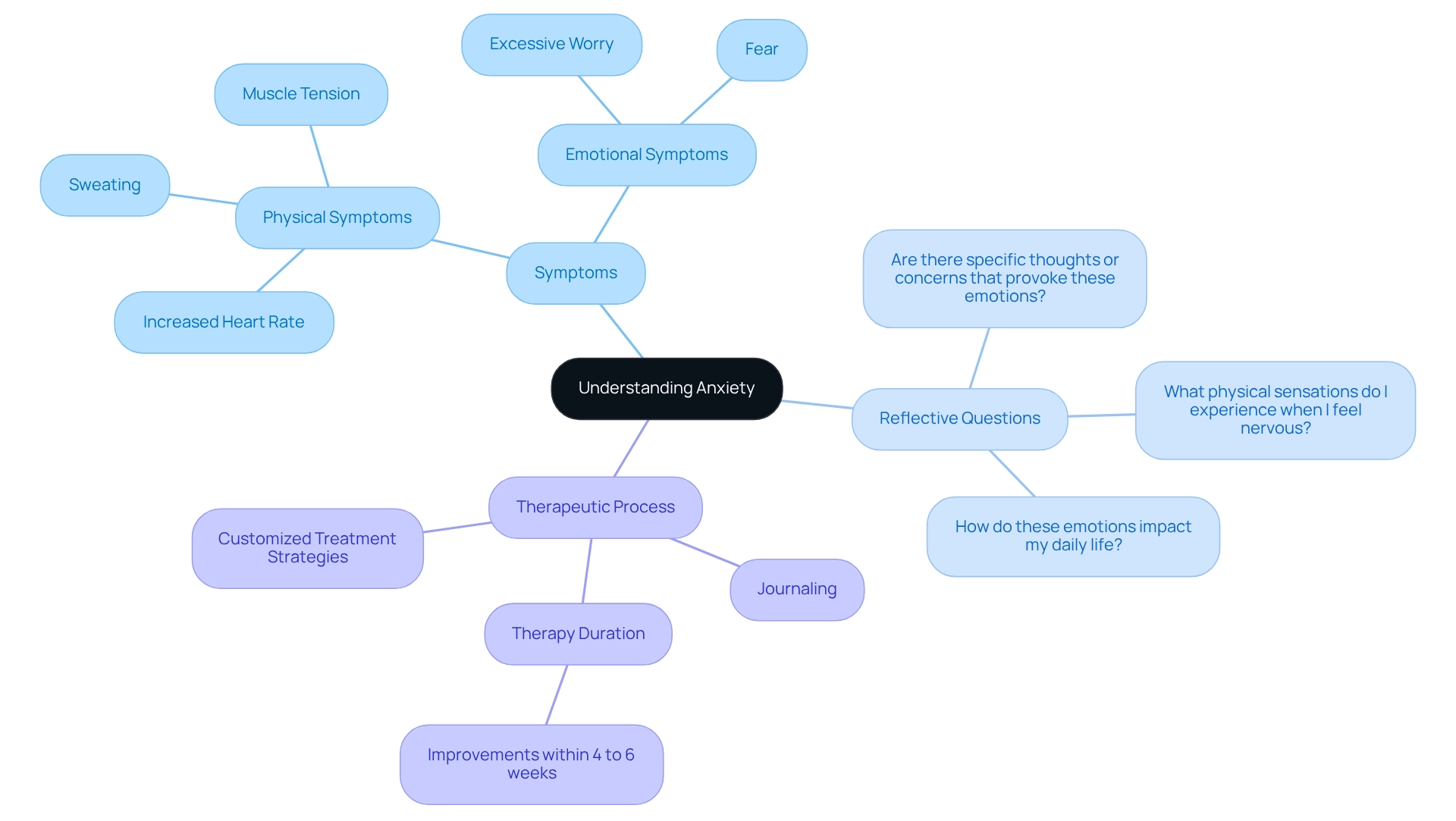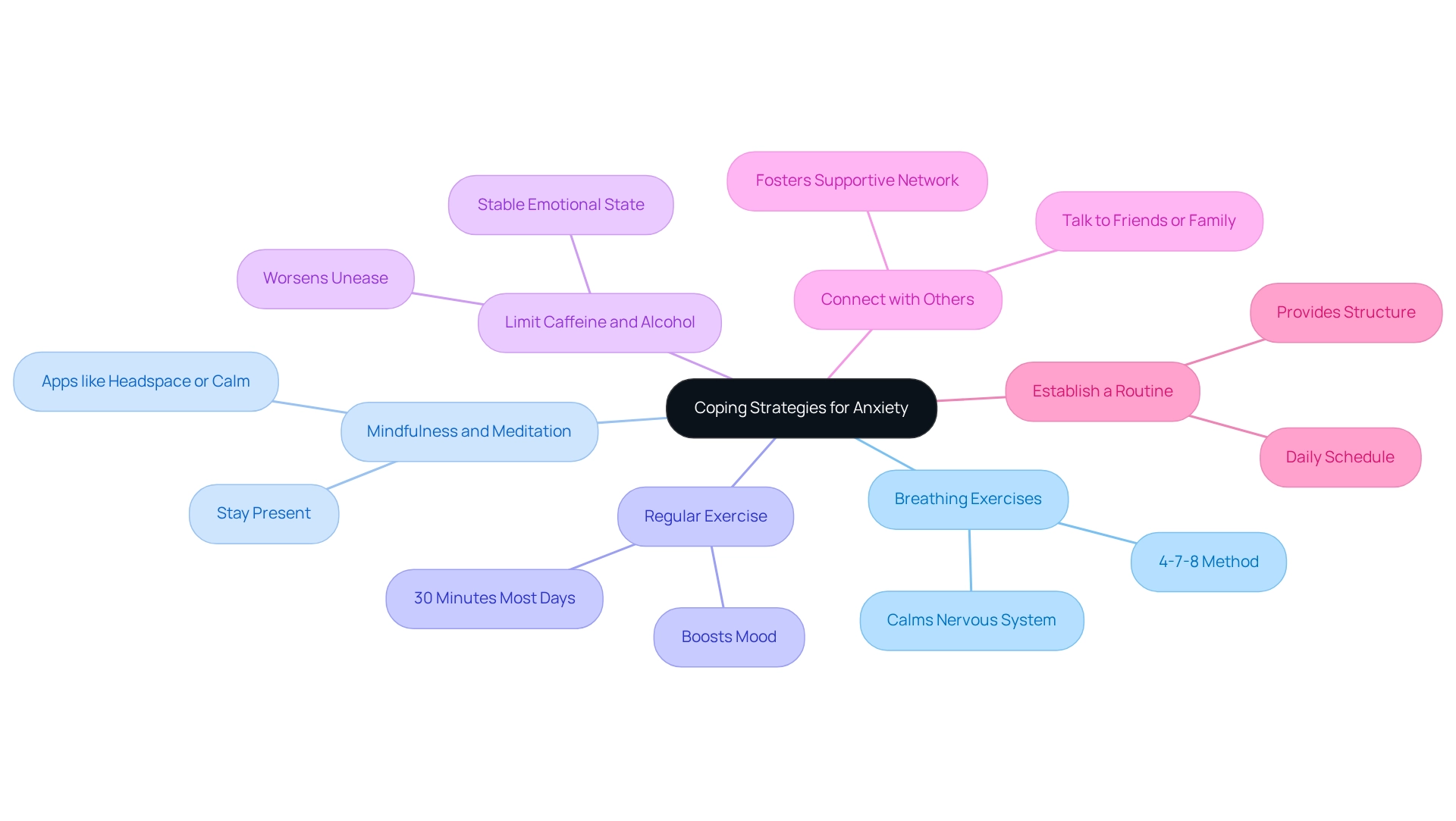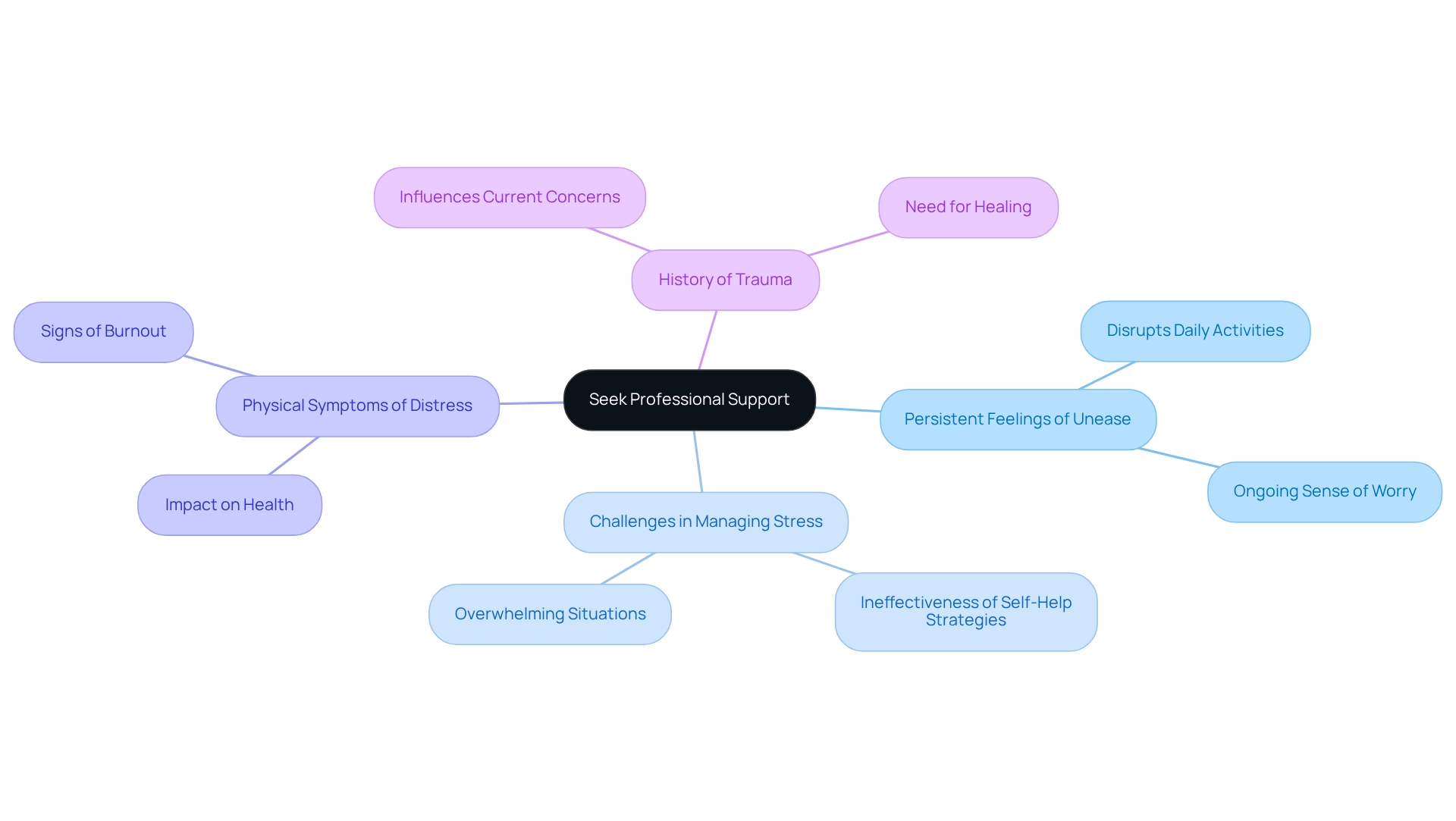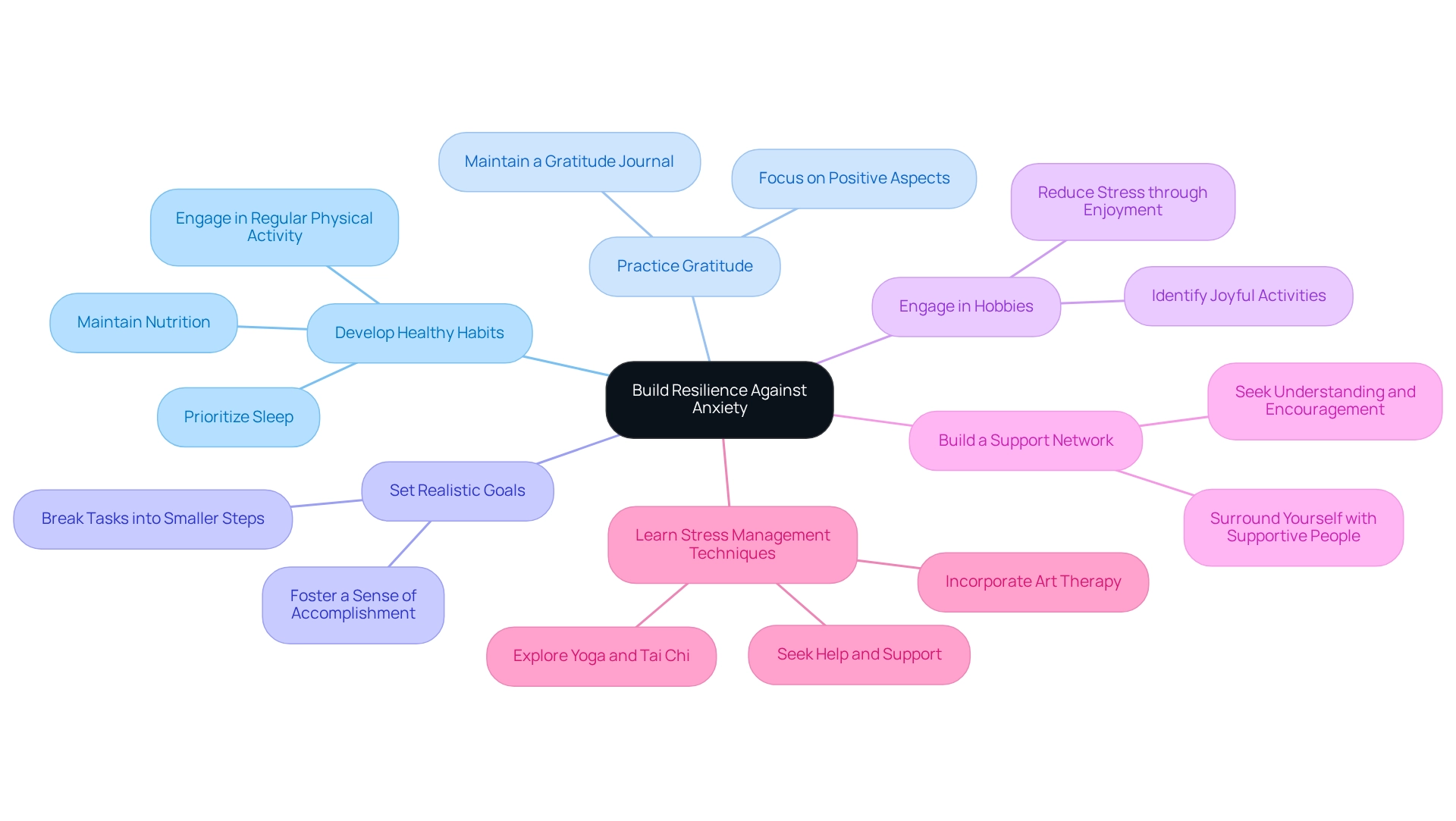Overview
To alleviate feelings of anxiety, individuals can embrace compassionate coping strategies, such as:
- Deep breathing exercises
- Mindfulness practices
- Regular physical activity
- The establishment of a supportive routine
These techniques not only assist in managing immediate anxiety symptoms but also nurture long-term resilience. They foster healthy habits and encourage social connections, ultimately leading to improved emotional well-being.
Have you ever felt overwhelmed by anxiety? Remember, taking these steps can be a gentle way to support your journey toward healing and emotional balance.
Introduction
In a world where anxiety is increasingly prevalent, understanding and managing this complex emotion is more critical than ever. Have you ever felt overwhelmed by anxious moments, grappling with physical sensations that disrupt your peace? Anxiety manifests in diverse ways, impacting both your mind and daily life.
This article gently explores:
- How to recognize the signs of anxiety
- Implementing effective coping strategies
- Knowing when to seek professional help
Additionally, it highlights the importance of building long-term resilience through healthy habits and supportive networks. As we delve into these aspects, you can embark on a journey toward greater mental wellness and stability, nurturing your emotional health along the way.
Understand Anxiety: Recognize Your Feelings
Anxiety can manifest in various ways, including physical symptoms like increased heart rate, sweating, and muscle tension, as well as emotional symptoms such as excessive worry and fear. To acknowledge your sensations of unease, begin by noticing your body's responses in tense circumstances. Ask yourself:
- What physical sensations do I experience when I feel nervous?
- Are there specific thoughts or concerns that provoke these emotions?
- How do these emotions impact my daily life?
Maintaining a journal can assist in monitoring these patterns, making it simpler to recognize triggers and comprehend your distress more effectively. Remember, acknowledging your feelings is a vital step toward understanding how to stop feelings of anxiety and managing them effectively.
At The Emerald Couch, we understand that the journey to wellness is unique for each individual. Therapy duration varies, but many clients begin to see improvements within 4 to 6 weeks. Our customized treatment strategies are created to address your individual requirements, ensuring that you obtain the tailored assistance essential for trauma and recovery. We also offer virtual appointments for those who may need them. Together, we will , allowing you to feel stable and supported throughout your journey.

Implement Coping Strategies: Techniques to Manage Anxiety
Managing anxiety can feel overwhelming, but learning how to stop feelings of anxiety involves several effective coping strategies that can help you find relief and regain a sense of calm.
- Breathing Exercises: Have you ever noticed how your breath changes when you're anxious? Practicing deep breathing techniques, such as the 4-7-8 method—inhale for 4 seconds, hold for 7 seconds, and exhale for 8 seconds—can truly help calm your nervous system. This simple practice can be a powerful tool in moments of stress.
- Mindfulness and Meditation: Engaging in mindfulness practices allows you to stay present, even in the midst of anxiety. Consider using apps like Headspace or Calm, which can guide you through meditation sessions that nurture your mind and spirit.
- Regular Exercise: Physical activity is another wonderful way to lower stress levels. Aim for at least 30 minutes of moderate exercise most days of the week. Think of it as a gift to yourself, one that not only boosts your mood but also enhances your overall well-being.
- Limit Caffeine and Alcohol: Both caffeine and alcohol can worsen feelings of unease. Have you considered how these substances affect your mood? Reducing or eliminating them from your diet can lead to a more stable emotional state.
- Connect with Others: Talking to friends or family about your emotions can be incredibly healing. Sharing your experiences not only provides relief but also fosters a supportive network that understands your journey.
- Establish a Routine: Creating a daily schedule can provide the structure and predictability that helps diminish sensations of unease. As you establish this routine, you may find a comforting rhythm that supports your mental health and helps you learn how to stop feelings of anxiety. Remember, it’s okay to seek help and explore these options further. You are not alone on this journey.

Seek Professional Support: When to Consult a Therapist
Recognizing when to seek professional assistance for stress is crucial, particularly for those who identify as overachievers, often placing work or family above their own needs. If you find yourself feeling overwhelmed, worried, or burnt out, consider reaching out to a therapist to understand how to stop feelings of anxiety. You might want to reflect on whether you experience:
- Persistent feelings of unease that disrupt your daily activities.
- Challenges in managing stress, even after trying self-help strategies that teach how to stop feelings of anxiety.
- Physical symptoms of distress that are impacting your health.
- A history of trauma that could be influencing your current concerns.
At The Emerald Couch, our therapists offer a variety of treatment options, including Cognitive Behavioral Therapy (CBT), which has proven effective for addressing related disorders. They are here to support you in navigating the complexities of trauma and distress, providing you with strategies to reclaim a sense of safety in your body and life. Together, we can help you give your trauma its rightful place in your past. Remember, reaching out for help is a sign of strength and an essential step toward healing. Have you ever felt overwhelmed by your past? Don’t hesitate to take that brave step forward.

Establish Long-Term Wellness: Build Resilience Against Anxiety
To build resilience against anxiety, consider these nurturing strategies:
- Develop Healthy Habits: Prioritize sleep, nutrition, and regular physical activity to support your mental health. These foundational elements can significantly enhance your emotional well-being.
- Practice Gratitude: Have you ever noticed how focusing on the positive can shift your mindset? Maintaining a gratitude journal allows you to concentrate on the uplifting aspects of your life, steering your thoughts away from worry.
- Set Realistic Goals: It’s easy to feel overwhelmed by larger tasks. By breaking them into smaller, manageable steps, you can foster a sense of accomplishment and reduce that weight on your shoulders.
- Engage in Hobbies: What activities bring you joy? Spending time doing things you love can effectively reduce stress and elevate your mood, creating space for positivity in your life.
- Build a Support Network: Surrounding yourself with supportive friends and family is crucial. They can offer understanding and encouragement, reminding you that you are not alone in your journey.
- Learn Stress Management Techniques: Exploring techniques such as yoga, tai chi, or art therapy can enhance your coping skills. These practices can help you navigate through challenging times with grace, and by incorporating them into your daily life, you can cultivate resilience and discover how to stop feelings of anxiety over time. Remember, seeking help and support is a brave step towards healing.

Conclusion
Recognizing and understanding anxiety is the first critical step toward managing this complex emotion. Have you ever felt overwhelmed by your feelings? By being aware of both the physical and emotional symptoms, individuals can begin to identify their triggers and take control of their emotions. Journaling and self-reflection are powerful tools that can facilitate this process, allowing for a deeper understanding of how anxiety manifests in daily life.
Implementing effective coping strategies, such as breathing exercises, mindfulness, and regular physical activity, can significantly alleviate anxiety symptoms. It is essential to create a supportive environment by connecting with others and establishing a structured routine that fosters stability. These strategies empower individuals to navigate their anxiety with greater confidence and clarity.
Knowing when to seek professional help is equally important. The decision to consult a therapist can lead to tailored support and effective treatment options, particularly in cases where self-help strategies are insufficient. Recognizing that seeking help is a sign of strength can be transformative in the journey toward healing.
Ultimately, building long-term resilience against anxiety involves developing healthy habits, practicing gratitude, and cultivating a robust support network. By integrating these practices into everyday life, individuals can enhance their emotional well-being and create a foundation for sustained mental health. Embracing this journey not only nurtures personal growth but also fosters a deeper sense of peace and stability in an increasingly anxious world.
Frequently Asked Questions
What are the physical symptoms of anxiety?
Physical symptoms of anxiety can include increased heart rate, sweating, and muscle tension.
What are the emotional symptoms associated with anxiety?
Emotional symptoms of anxiety may involve excessive worry and fear.
How can I begin to acknowledge my feelings of anxiety?
You can start by noticing your body's responses in tense situations and asking yourself specific questions about your physical sensations, thoughts, and the impact of these emotions on your daily life.
How can journaling help with anxiety?
Maintaining a journal can assist in monitoring patterns of anxiety, making it easier to recognize triggers and understand your distress more effectively.
Why is acknowledging my feelings important in managing anxiety?
Acknowledging your feelings is a vital step toward understanding how to stop feelings of anxiety and managing them effectively.
How long does therapy typically take to show improvements for anxiety?
Many clients begin to see improvements within 4 to 6 weeks of starting therapy.
How does The Emerald Couch tailor its therapy for individuals?
The Emerald Couch creates customized treatment strategies to address individual needs, ensuring tailored assistance for trauma and recovery.
Are virtual appointments available for therapy at The Emerald Couch?
Yes, The Emerald Couch offers virtual appointments for those who may need them.




